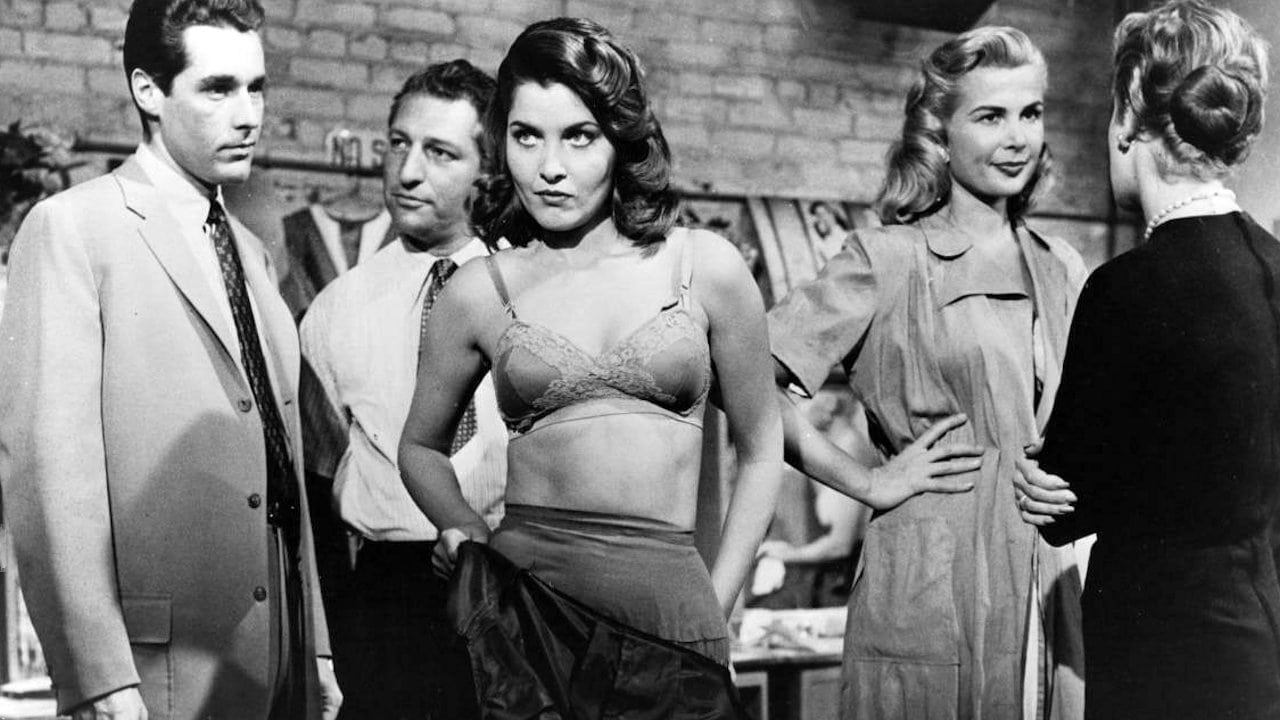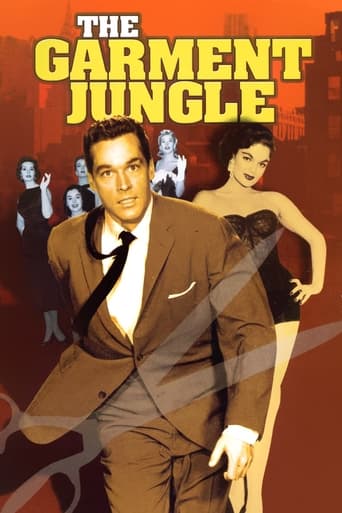RyothChatty
ridiculous rating
Breakinger
A Brilliant Conflict
Nayan Gough
A great movie, one of the best of this year. There was a bit of confusion at one point in the plot, but nothing serious.
Bob
This is one of the best movies I’ve seen in a very long time. You have to go and see this on the big screen.
dougdoepke
No need to recap the plot. Those who compare this racketeering movie with The Phenix City Story (1955) are making an apt comparison. The problem for this film, unlike Karlson's, is that The Garment Jungle has too many flaws to succeed as a minor gem. At its core, it's a good gritty film with a gutsy screenplay and a powerhouse selection of featured players. But, the end result is compromised by two key flaws. No matter how you cut it, Kerwin Mathews is simply not up to the challenge of his pivotal role as the conscionable son. Unlike Richard Kiley of Phenix Story who must go through similar changes, Mathew's bland demeanor remains the same even after he's committed to fighting corruption and his father. He has basically one emotionless expression for every occasion. The words are there, but crucially not the required feeling. Unfortunately, he has extended scenes with three very strong personalities, Cobb, Loggia, and Boone, and except for the camera, you might even forget he's there. It's a big emotional hole that carves a vacuum right through the picture's middle, detracting from the overall impact. In Mathew's defense, it is his first starring role, and it is a demanding part. Clearly, he's got the looks but not the skills; at the same time, he was probably wise to make a career of undemanding special- effects movies. Still and all, consider how much stronger the impact would be were the movie's ordeals reflected in Mitchell Jr.'s changed character as he goes through them.Second, it certainly does matter who directed the scenes. Pulling Robert Aldrich off the film was a major blunder in terms of overall quality. Like fellow noir specialists Phil Karlson and Anthony Mann, Aldrich doesn't just show us violence, he makes us feel it. Consider the brutal undercurrent running through three key scenes—the elevator crash, Tulio's murder, and the union meeting. The audience doesn't just see the violence or threats of violence, we feel them with a palpable sense of dread. I suspect this is a talent that can't be taught; instead, it comes from a sensibility deeper than mere technique. Now, contrast those scenes with the utterly pedestrian last 10 minutes—the fist-fight with Boone, the cops coming in at just the right moment. These are clichés without feeling or undercurrent, and I would bet the house that Sherman directed those very forgettable episodes. I also suspect Sherman, a "woman's" director, was brought in to soften the ending into something more conventional and play up Scala's part, and especially French's otherwise non-essential role. Nonetheless, those last 10 minutes contrast sharply with the noir sensibility that is unmistakably Aldrich's.At the same time, I wonder whose idea it was to have dad Mitchell's (Cobb) murder occur off-camera. To me that should be a dramatic highpoint of the story, where Mitchell's corrupt past catches up despite his good efforts at reform. Cobb could certainly have transformed such a scene into a vivid emotional climax that would have added a memorably tragic touch. However, the way it's done off-camera produces no impact at all. My guess is that the studio was leery of adding another violent scene to those already in place; after all, this was the period of the Production Code with its strictures on what could be said, what could be shown.None of this is to deny that Jungle remains a riveting social-conscience film with an unusually fine New York cast, a gutsy script, and some gritty street photography. But much of that overall impact, I believe, is due to the outstanding noir sensibility of Robert Aldrich. More importantly, had Columbia Studio left him alone and in charge, the movie could easily have become a classic along the lines of his Kiss Me Deadly instead of the unevenly good film it finally is.
edwagreen
Terrific film in the genre of "On the Waterfront." This one involves efforts to unionize the dress industry and the violence by mobsters hired by bosses to thwart the unions from getting a hold on the workers.Lee J. Cobb is perfect as the role of the garment boss who has paid for years to keep the union out of his business. When his partner is murdered by gangsters when the former is willing to sign on with the union, this occurs just in time as Cobb's son, well played by Kerwin Matthews, arrives from Europe on the scene and is willing to learn the business. He soon realizes why his father has kept him out and when an organizer for the union is murdered, he becomes totally sympathetic with the union movement as well as the widow (Gia Scala) of the slain organizer.The picture captures the woes of garment workers and the mobsters who were hired to keep them out.It is to be noted that the garment industry always had a history of difficulty with labor. Many of these places were in violation of National Labor Board rules and were continuously fined for abusing workers.This is a picture of rare quality with solid acting performances by a terrific cast.The film should especially be viewed by all the anti-union activists out there.
jimmccool
I was lucky enough to see a VHS-transfer copy of this, and despite the poor quality, I can recommend this as a top-notch Crime/Mob/Racket thriller. Not exactly noir, but shares many many similar qualities - fast pace, seedy NY locations, opening voice-over etc. Think 'Phenix City Story' and you won't go far wrong - though this is actually even better than that. As usual, Lee J. Cobb is outstanding. And it seems strange to see Cobb here, in such an unashamedly 'leftish' film, after the trouble he had with HUAC earlier in the decade. There's not one mention of the 'C' word, though "anti-communism" would undoubtedly have been the cover for the Mob's anti-union activities... This is only one of very few films I can think of from Hollywood with a pro-Union message - and I doubt if it could even have been made during the height of the McCarthyite witch-hunt. Find it, watch it, enjoy it. And then join your local trade union, organise to keep the mobsters and agitators out.
bmacv
In 1956, in broad daylight in midtown Manhattan, labor columnist Victor Riesel, who had written an expose of corruption in a Long Island union, was blinded by a bottle of acid flung into his face. This was the brutal New York battleground in which the aptly named The Garment Jungle took place the following year, a tough and absorbing drama about the fight to unionize the rag trade.Lee J. Cobb runs a women's-dresses firm; his ardently pro-labor partner, in the opening moments of the film, plummets to his death down a freight elevator shaft. It was no accident. Proud entrepreneur Cobb, though shaken, persists in his campaign to keep unions out of his shop by paying protection to a ruthless mobster (Richard Boone). Cobb's son (Kerwin Matthews) returns from a stay in Europe and, sympathizing with the piece-work jobbers, starts poking his nose into his father's business arrangements. He befriends a union organizer (Robert Loggia) who meets with a knife in an alley. Ultimately even Cobb comes to realize he's been dancing with the devil and tries to break off his alliance with Boone, who in turn unleashes his standard retaliation. But Matthews discovers the location of ledgers recording the history pay-offs....Vincent Sherman, a veteran of both Bette Davis and Joan Crawford, directed, with some measure of assistance from Robert Aldrich. But here no divas reign; both Gia Scala and Valerie French take subsidiary roles, if not small ones. Hard guys dominate the movie, as they did in On The Waterfront, another look at New York City's labor relations (while nowhere near as mythic as that epic, The Garment Jungle matches it in brutality and in an unapologetically leftist point of view).The movie boasts clarity and pace; there's even some nicely observed detail. Early scenes in the factory cleave into an upstairs/downstairs dichotomy: the jobbers sweat and toil for a pittance while the fashion models step into and out of elegant frocks (but, in malicious asides, the models grouse about being exploited as `escorts' for out-of-town buyers looking for a big night in the Big Apple). With the exception of the merely serviceable Matthews (whose young career stumbled after this movie and never regained its footing), the cast is notably fine. Cobb reins in his basso-profundo growl and curmudgeonly shtik, while Boone, Loggia (in his credited debut) and Joseph Wiseman (as a union stoolie) give restrained, convincing performances. Moments when the script threatens to go treacly are swiftly undercut by violence, and the movie never wavers from its plea on behalf of men and women risking their very lives to fight for a living wage. It's a stance that will strike many as hopelessly dated, in an era when Americans aspire to the status of stockholders; maybe that accounts for the obscurity of a bold and unsentimental film from late in the noir cycle that is brazen enough to make an overt political statement.

